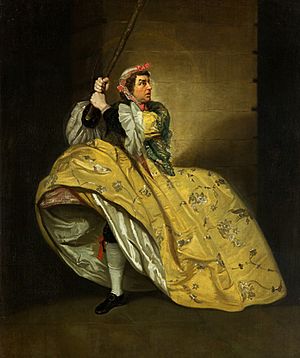David Garrick facts for kids
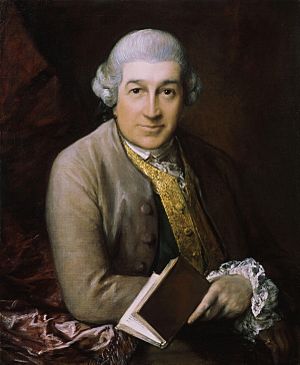
David Garrick (born February 19, 1717 – died January 20, 1779) was a famous English actor, writer, and theatre manager. He had a huge impact on theatre across Europe in the 1700s. He was also a student and friend of the famous writer Samuel Johnson.
Garrick started acting in amateur plays. People really noticed him when he played the main character in Shakespeare's Richard III. His acting was so good that theatre managers quickly became interested.
Charles Fleetwood, a theatre manager, hired Garrick for a season at the Theatre Royal, Drury Lane in London. Garrick stayed with the Drury Lane company for five years. Then, he bought a share of the theatre with James Lacy. This started Garrick's 29 years as manager of Drury Lane. Under his leadership, it became one of the most important theatres in Europe.
When he died, three years after leaving the stage, he had a big public funeral. He was buried in Westminster Abbey in a special area called Poets' Corner.
As an actor, Garrick brought a new, more realistic style to the stage. Before him, acting was often very loud and over-the-top. His natural way of acting thrilled audiences. He also directed many top actors, influencing their styles.
As a manager, Garrick tried to improve how audiences behaved. This caused some complaints at first, but many of his changes eventually stuck. He also made theatre productions more consistent. This included everything from set design and costumes to special effects.
Garrick also influenced the writing side of theatre. Most critics agree he wasn't the best playwright himself. However, he was great at making Shakespeare's plays exciting for people of his time. He also updated many older plays that might have been forgotten. These included plays from the Restoration period. He helped make theatre a more respected profession. His friend Samuel Johnson once said, "his profession made him rich and he made his profession respectable."
Contents
Early Life and Beginnings
Garrick was born in Hereford, England, in 1717. His family had French Huguenot roots from southern France. His grandfather had to flee France in 1685 because Protestants lost their rights there. His father, Peter, was smuggled out as a baby. The family later moved to Lichfield, his mother's hometown. Garrick's father was an army captain. He was often stationed in Gibraltar during Garrick's childhood.
Garrick was the third of seven children. His younger brother, George, worked as his aide for his whole life. People say George would often ask, "Did David want me?" when his brother was gone. When David Garrick died in 1779, George died just 48 hours later. Some people joked that David really did want him.
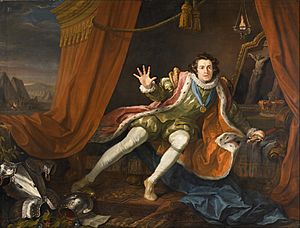
O coward conscience, how dost thou afflict me! – Shakespeare's Richard III Act V, Sc. 3.
David Garrick in 1745 as Richard III. He wakes from a dream haunted by ghosts of those he murdered. Painting by William Hogarth.
At 19, Garrick went to Samuel Johnson's school. He loved theatre from a young age. He even acted in a school play called The Recruiting Officer. After the school closed, Garrick and Johnson, who were now friends, went to London. They hoped to find success there.
In 1737, Garrick and his brother started a wine business. David managed the London part. The business didn't do well. This was probably because Garrick was more interested in amateur theatre. One playwright joked that Garrick only had three quarts of vinegar in his cellar.
In 1740, Garrick's first play, Lethe: or Aesop in the Shade, was performed. It was shown at the Theatre Royal, Drury Lane. Within a year, he was acting professionally. He played small roles at the Goodman's Fields Theatre. This theatre had been closed by a law that said plays needed approval. Garrick got to perform there because the manager, Henry Giffard, had helped him with his wine business.
Becoming a Professional Actor
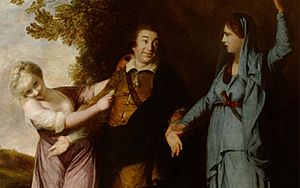
Garrick made his first professional acting appearance in 1741. He was on a summer tour in Ipswich with Giffard's group. He used the stage name Lyddal so his family wouldn't know. But the managers of Drury Lane and Covent Garden still turned him down.
On October 19, 1741, Garrick played the main role in Richard III. He had been coached by actor Charles Macklin. His natural acting style was a big change from the loud, dramatic style common at the time. Soon, everyone in London was talking about him. After seeing him perform, Horace Walpole said, "there was a dozen dukes a night at Goodman's Fields."
After his success, Garrick wrote to his brother. He asked to leave their business to focus on acting. He found success with Richard III and then took on many other roles. These included Shakespeare's King Lear and funny roles like Bayes in The Rehearsal. In his first six months, he played 18 different roles! Alexander Pope, a famous poet, saw him three times. He said, "that young man never had his equal as an actor, and he will never have a rival."
Because of his success, Charles Fleetwood, the manager of Drury Lane, hired Garrick. Garrick played Chaumont in The Orphan in May 1742. He also played King Lear and his popular Richard III. Fleetwood then hired Garrick for the whole 1742–43 season.
Managing Drury Lane Theatre
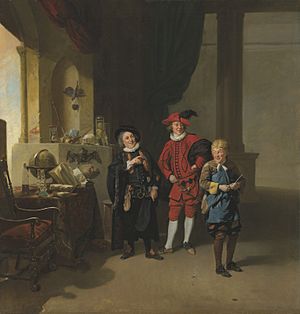
After the London season, Garrick went to Dublin for the summer. He added new roles to his list, like Shakespeare's Hamlet. He also played Abel Drugger in Ben Jonson's The Alchemist, which earned him much praise. One of his early fans, John Boyle, 5th Earl of Cork, wrote letters recommending Garrick's acting. Garrick said this was why he was "more caressed" in Dublin.
Five years after joining Drury Lane, Garrick went back to Dublin. This time, he managed and directed at the Smock Alley Theatre with Thomas Sheridan. After returning to London, he acted at Covent Garden. One of his own short plays, Miss in Her Teens, was also performed there.
In April 1747, Garrick and James Lacy took over Drury Lane Theatre. The theatre had been struggling for years. But Garrick and Lacy's partnership brought it great success. Their first show opened with a special poem about Drury Lane and Shakespeare. Garrick read the poem, which was written by his friend, Dr. Johnson. The poem promised that they would "please to live," meaning they would give audiences what they wanted. This shows how Garrick balanced artistic quality with public taste.
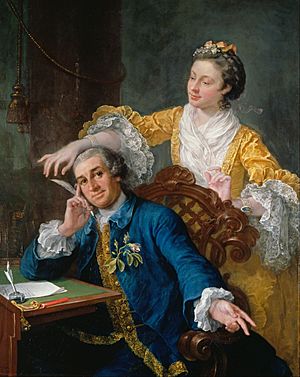
Garrick met Eva Marie Veigel (1724–1822), a German dancer, in London in 1746. They married on June 22, 1749. They were shown together in several paintings, including one by William Hogarth. Their marriage was happy, and Garrick called her "the best of women and wives." They were known for being always together. They did not have children.
As Garrick became wealthier, he bought a beautiful home for them. It was called Garrick's Villa and was in Hampton. He also built a special Temple to Shakespeare by the river at Hampton. This temple held his collection of Shakespeare items.
In September 1769, Garrick organized the Shakespeare Jubilee in Stratford-upon-Avon. This event helped make Shakespeare known as England's national poet. It celebrated 200 years since Shakespeare's birth, though it was five years late. Garrick gave a speech praising the Shakespeare Ladies Club. He said they "restor'd Shakespeare to the Stage" and built a monument to him.
No Shakespeare plays were actually performed during the Jubilee. Heavy rain even stopped a parade. But the parade was later staged at Drury Lane Theatre as The Jubilee. It was very successful, with 90 performances. A famous song, "Soft Flowing Avon", was written by Thomas Arne with lyrics by Garrick for the Jubilee.
Garrick managed the Theatre Royal, Drury Lane, until he retired in 1776. In his last years, he continued to take on new roles. Posthumus in Cymbeline was one of his last famous parts.
Death and Legacy
Shortly before he died, Garrick worked on a play called The Camp at Drury Lane. He caught a bad cold. The play made fun of how Britain reacted to a possible French invasion. Some people joked that Garrick was the only person harmed by the invasion that never happened.
He died less than three years after retiring, at his home in London. He was buried in Poets' Corner in Westminster Abbey. His wife, Mrs. Garrick, lived for 43 more years, reaching the age of 98.
A New Style of Acting
Perhaps Garrick's acting was what made him most famous. He was not a tall man, only about 5 feet 4 inches. His voice was not described as very loud. But from his first performance, Garrick changed acting forever. He moved away from the loud, over-the-top style that was popular. Instead, he chose a more relaxed, natural style. His biographer, Alan Kendall, said this style "would probably seem quite normal to us today, but it was new and strange for his day."
This new style brought him great praise. Alexander Pope worried that Garrick would be "spoiled, for he would have no competitor." Garrick quoted George Lyttelton as saying, "He told me he never knew what acting was till I appeared." Even James Quin, an actor from the old style, said, "If this young fellow be right, then we have been all wrong."
Memorials and Tributes
- A two-volume book about his life was written by Thomas Davies. It was called Memoirs of the life of David Garrick, Esq.
- The Garrick Club in London is named after him.
- Garrick's Temple to Shakespeare was built in his garden near Hampton Court. It is now a memorial to him.
- A carved stone medallion of Garrick is on display at Birmingham Central Library.
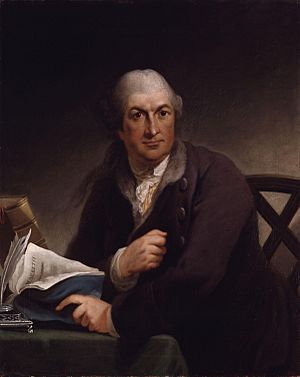
- Garrick was the first actor to be buried in Westminster Abbey. He rests in Poets' Corner next to William Shakespeare's monument. Later, Henry Irving and Laurence Olivier were also buried there.
- Cedric Hardwicke played Garrick in the 1935 film Peg of Old Drury.
- A 1937 film, The Great Garrick, tells a made-up story about his acting skills. Brian Aherne played Garrick.
- In 1969, Ian McShane played Garrick in a British TV show called Rogues' Gallery.
- He appears as a character in plays like David Garrick (1864) and Mr Foote's Other Leg (2015).
- A school house at King Edward VI School, Lichfield is named after him.
- The lyrics he wrote for "Heart of Oak" are still the official march of the Royal Navy.
- Legend says he was so focused during a performance of Richard III that he didn't notice a broken bone. This might be where the phrase "Break a leg!" comes from.
- Several pubs are named after him, including The Garrick Inn in Stratford-upon-Avon.
Theatres Named After Garrick
Many theatres have been named in honor of David Garrick:
- Two theatres in London have been named for him. The first opened in 1831 and closed in 1881. The second, opened in 1889 as the Garrick Theatre, is still open today.
- The Lichfield Garrick Theatre in Lichfield, England, is named after him.
- Two amateur theatres in Greater Manchester, the Altrincham Garrick Theatre and the Stockport Garrick Theatre (1901), also carry his name.
- The arts and theatre building at Hampton School is named after him.
- A community theatre in Guildford, Western Australia, is named after Garrick. It started in 1932 and is the longest-running amateur theatre in Perth.
- A community theatre in Bonavista, Newfoundland, Canada, is also named after Garrick.
Major Works
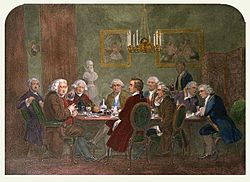
Garrick wrote or adapted many plays during his career:
- Lethe: or, Aesop in the Shades (1740)
- The Lying Valet (1741)
- Miss in Her Teens; or, The Medley of Lovers (1747)
- Lilliput (1756)
- The Male Coquette; or, Seventeen Fifty Seven (1757)
- The Guardian (1759)
- Harlequin's Invasion (1759)
- The Enchanter; or, Love and Magic (1760)
- The Farmer's Return from London (1762)
- The Clandestine Marriage (1766)
- The Country Girl (1766)
- Neck or Nothing (1766)
- Cymon (1767)
- Linco's Travels (1767)
- A Peep Behind the Curtain, or The New Rehearsal (1767)
- The Jubilee (1769)
- The Irish Widow (1772)
- A Christmas Tale (1773)
- The Meeting of the Company; or, Bayes's Art of Acting (1774)
- Bon Ton; or, High Life Above Stairs (1775)
- The Theatrical Candidates (1775)
- May-Day; or, The Little Gypsy (1775)
Images for kids
-
David Garrick's portrait, by Kauffman
See also
 In Spanish: David Garrick para niños
In Spanish: David Garrick para niños
 | William Lucy |
 | Charles Hayes |
 | Cleveland Robinson |


